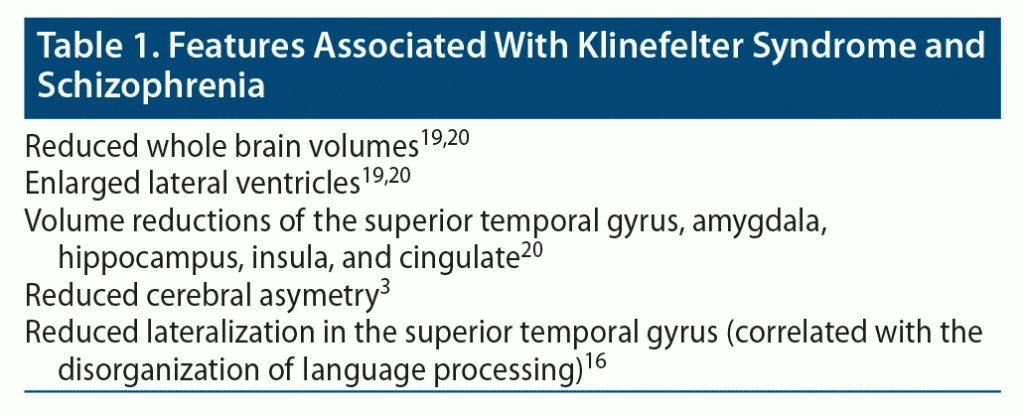
Prim Care Companion CNS Disord 2021;23(6):20cr02883
To cite: Côrte-Real B, Câmara Pestana PC, Cordeiro C, et al. Schizophrenia in Klinefelter syndrome. Prim Care Companion CNS Disord. 2021;23(6):20cr02883.
To share: https://doi.org/10.4088/PCC.20cr02883
© Copyright 2021 Physicians Postgraduate Press, Inc.
aDepartment of Psychiatry and Mental Health, Hospital de Santa Maria, Lisbon, Portugal
bFaculty of Medicine, University of Lisbon, Lisbon, Portugal
*Corresponding author: Beatriz Côrte-Real, MD, Hospital de Santa Maria, Avenida Professor Egas Moniz, Lisbon, 1649-035 Portugal 3.51E+11 ([email protected]).
Klinefelter syndrome is the most common sex chromosome disorder in males, characterized in the majority of cases by an extra X chromosome (47, XXY), with a prevalence of 0.1%–0.2% in the general population.1,2 Klinefelter syndrome is a natural genetic model for studies of X chromosome gene expression and androgen effects on brain development/function. A relevant body of literature has reported the increased occurrence of schizotypal traits and full-blown psychotic disorders in patients with Klinefelter syndrome,3–6 but also among patients with other sex chromosome abnormalities.7 We report a case of early onset schizophrenia in a patient with Klinefelter syndrome.
Case Report
Mr A was a 54-year-old man with a seventh grade education who retired at age 23 years due to disability (his only work history was in his father’s shop during a brief period). He lived with his parents until their passing when he was 30 years old. After that, he moved in with his siblings, and, at age 53 years, he started living with a professional caretaker hired by his family. No consanguinity or family history of psychiatric or genetic disorders was reported.
He has a medical history of Klinefelter syndrome, confirmed by karyotype study (47, XXY) and a related cognitive impairment (IQ test score of 60). Additionally, he was diagnosed with schizophrenia at age 15 years due to an existence of reference and persecutory delusions, verbal hallucinations commenting on behaviors and sometimes talking directly to the patient, passivity of thought and will, and hetero-aggressive behavior. The patient started psychiatric follow-up and medication, which he could not name. Gradually after this first psychotic episode, functionality was even more affected. His parents guaranteed medication adherence. Due to lack of supervision when his parents died, he stopped taking any medication and was hospitalized due to a psychotic episode for the first time. He maintained follow-up for 10 years until he abandoned the appointments. By then, he was taking chlorpromazine 35 mg/d, carbamazepine 400 mg/d, and haloperidol 4 mg/d, but his compliance was very irregular.
The patient was never able to perform instrumental activities of daily living. However, in the past few years, he had lost the capacity to perform basic activities, such as dressing himself, showing a progressive cognitive decline.
When he was 53 years old, a professional caretaker was hired by his siblings. She noticed soliloquies, suspiciousness, and behavioral abnormalities (eg, hetero-aggressivity, wandering the streets at all hours), and he was referred to a psychiatry appointment. Upon observation, the patient had intact orientation; politeness; childlike posture; persecutory, reference, and grandiose delusions of poor systematization; verbal hallucinations commenting on behaviors; difficulty in interpreting social cues; poor abstract thinking; and euthymic humor with affective rigidity. The symptoms remitted partially with haloperidol 5 mg/daily, with the patient maintaining self-referential ideas with partial insight. Medication compliance was assured by the caretaker.
Discussion
The potential role of X chromosome genes in schizophrenia pathogenesis has been extensively investigated, with chromosomal syndromes being used as paradigmatic models for this purpose. Regarding the clinical features, both Klinefelter syndrome and schizophrenia are associated with impaired social cognition. Some studies suggest that this impairment is related to a compromised function of the amygdala, fusiform gyrus, insula, and superior temporal sulcus.8 The patient’s IQ was not surprising, since a low IQ is associated with a greater risk for schizophrenia.9–11 Additionally, many genes responsible for cognitive development are in the X chromosome,12,13 with approximately half of all intellectual disabilities presenting a defect in the X chromosome.13,14 Hormone imbalance as the cause of cognitive deficit in Klinefelter syndrome has been ruled out,15,16 reinforcing the role of X chromosome abnormalities in cognition.
A previous study17 conducted among individuals with Klinefelter syndrome demonstrated a high rate of copy number variants. According to the authors,17 half of the X-linked copy number variants fell within regions encompassing genes. About 90% of these genes escape X inactivation and are within the regions of X-Y homology, particularly the Xq21.31 gene, which is related to cerebral asymmetry and psychosis.18
Interestingly, some of the neuroimaging abnormalities in Klinefelter syndrome (due to deleterious effects of the extra X aneuploidy on neurodevelopment) are also present in patients with schizophrenia (Table 1). The reduced hemispheric asymmetry, reported in both schizophrenia and Klinefelter syndrome, suggests that the genes implicated in the lateralization process are also located in the X chromosome.19
Regarding the early onset of schizophrenia in our patient, we can conceptualize that Klinefelter syndrome provided a structural and functional ground potentiating the development of schizophrenia and anticipating its onset. In conclusion, the symptomatic and neuroimaging overlap between Klinefelter syndrome and schizophrenia may lead us to hypothesize that both disorders might have a common pathway. Klinefelter syndrome might be a risk factor for not only schizophrenia but also its early onset. Further investigation is necessary to clarify the exact linkage between the 2 disorders.
Published online: November 4, 2021.
Potential conflicts of interest: Dr Côrte-Real reports nonfinancial support from Janssen-Cilag Farmacêutica, Lundbeck Portugal—Produtos Farmacêuticos, and Angelini Farmacêutica. Dr Câmara Pestana reports nonfinancial support from Janssen-Cilag Farmacêutica and Lundbeck Portugal—Produtos Farmacêuticos, Lda. Dr Cordeiro reports nonfinancial support from Janssen-Cilag Farmacêutica and Lundbeck Portugal-Produtos Farmacêuticos. Dr Martins reports personal fees from Janssen-Cilag Farmacêutica and Angelini Farmacêutica.
Funding/support: None.
Patient consent: Written permission was received from the patient to publish the case report, and information has been de-identified to protect anonymity.
References (20)

- Lanfranco F, Kamischke A, Zitzmann M, et al. Klinefelter’s syndrome. Lancet. 2004;364(9430):273–283. PubMed CrossRef
- Giagulli VA, Campone B, Castellana M, et al; On behalf of the Klinefelter ItaliaN Group King. Neuropsychiatric aspects in men with Klinefelter syndrome. Endocr Metab Immune Disord Drug Targets. 2019;19(2):109–115. PubMed CrossRef
- van Rijn s, Aleman A, Swaab H, et al. Klinefelter’s syndrome (karyotype 47,XXY) and schizophrenia-spectrum pathology. Br J Psychiatry. 2006;189(5):459–460. PubMed CrossRef
- DeLisi LE, Maurizio AM, Svetina C, et al. Klinefelter’s syndrome (XXY) as a genetic model for psychotic disorders. Am J Med Genet B Neuropsychiatr Genet. 2005;135B(1):15–23. PubMed CrossRef
- Boks MPM, de Vette MHT, Sommer IE, et al. Psychiatric morbidity and X-chromosomal origin in a Klinefelter sample. Schizophr Res. 2007;93(1-3):399–402. PubMed CrossRef
- Bruining H, Swaab H, Kas M, et al. Psychiatric characteristics in a self-selected sample of boys with Klinefelter syndrome. Pediatrics. 2009;123(5):e865–e870. PubMed CrossRef
- Pestana PC, Silva ID, Ferreira ALB, et al. Psychotic features of Turner syndrome. Prim Care Companion CNS Disord. 2018;20(5):17l02237. PubMed
- van Rijn S, Swaab H, Baas D, et al. Neural systems for social cognition in Klinefelter syndrome (47,XXY): evidence from fMRI. Soc Cogn Affect Neurosci. 2012;7(6):689–697. PubMed CrossRef
- Khandaker GM, Barnett JH, White IR, et al. A quantitative meta-analysis of population-based studies of premorbid intelligence and schizophrenia. Schizophr Res. 2011;132(2-3):220–227. PubMed CrossRef
- Woodberry KA, Giuliano AJ, Seidman LJ. Premorbid IQ in schizophrenia: a meta-analytic review. Am J Psychiatry. 2008;165(5):579–587. PubMed CrossRef
- Sørensen HJ, Mortensen EL, Schiffman J, et al. Premorbid IQ and adult schizophrenia spectrum disorder: verbal performance subtests. Psychiatry Res. 2010;178(1):23–26. PubMed CrossRef
- Gécz J, Mulley J. Genes for cognitive function: developments on the X. Genome Res. 2000;10(2):157–163. PubMed CrossRef
- Skuse DH. X-linked genes and mental functioning. Hum Mol Genet. 2005;14(suppl 1):R27–R32. PubMed CrossRef
- Xu J, Disteche CM. Sex differences in brain expression of X- and Y-linked genes. Brain Res. 2006;1126(1):50–55. PubMed CrossRef
- Savic I. Advances in research on the neurological and neuropsychiatric phenotype of Klinefelter syndrome. Curr Opin Neurol. 2012;25(2):138–143. PubMed CrossRef
- van Rijn S, Aleman A, Swaab H, et al. Effects of an extra X chromosome on language lateralization: an fMRI study with Klinefelter men (47,XXY). Schizophr Res. 2008;101(1-3):17–25. PubMed CrossRef
- Rocca MS, Pecile V, Cleva L, et al. The Klinefelter syndrome is associated with high recurrence of copy number variations on the X chromosome with a potential role in the clinical phenotype. Andrology. 2016;4(2):328–334. PubMed CrossRef
- Crow TJ. The XY gene hypothesis of psychosis: origins and current status. Am J Med Genet B Neuropsychiatr Genet. 2013;162B(8):800–824. PubMed CrossRef
- Warwick MM, Lawrie SM, Beveridge A, et al. Abnormal cerebral asymmetry and schizophrenia in a subject with Klinefelter’s syndrome (XXY). Biol Psychiatry. 2003;53(7):627–629. PubMed CrossRef
- Shen D, Liu D, Liu H, et al. Automated morphometric study of brain variation in XXY males. Neuroimage. 2004;23(2):648–653. PubMed CrossRef
Enjoy this premium PDF as part of your membership benefits!






